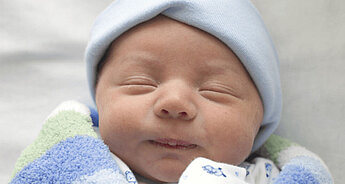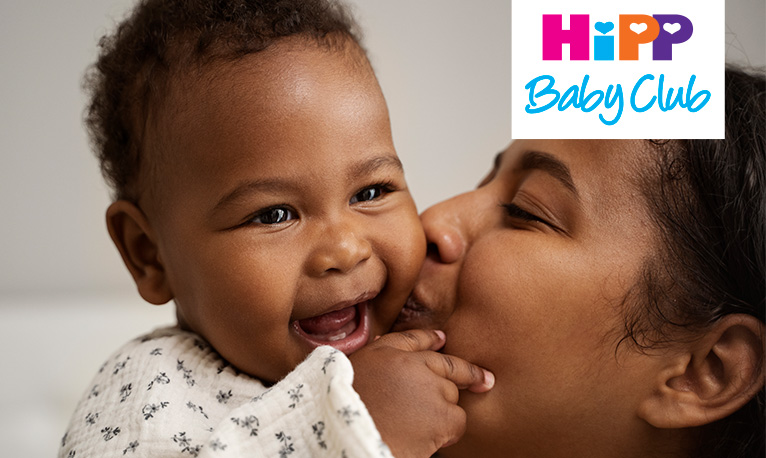Baby Development at 0-2 Weeks Old

Babies of this age...
- Newborn babies instinctively ‘root’ for the nipple in order to feed
- They can grasp strongly onto your finger or your clothes
- They have a ‘startle’ reflex, throwing out their arms and legs to the side at a sudden noise or movement
- If held under the arms with their feet touching a surface, newborns will make stepping movements
- Newborn babies pass dark, sticky motions at first; this is the ‘meconium’ in their bowels which built up in the womb
- They quickly learn to recognise their parents
Look after yourself
Your new baby is here at last - congratulations! Try to rest and make the most of this time when your baby is so tiny. It's a great opportunity to get to know and marvel at this little being who curls up and nestles into you with such trust.
It takes a little while for your body to recover, so don’t be surprised if you feel extra tired and emotional after the birth. You’ll likely feel some pains in your tummy in the first few days as your uterus contracts. The bloody discharge (‘lochia’) that you have after giving birth can last for up to six weeks. (Note: because your uterus is healing, it's best to use pads and not tampons to deal with the flow).
When you have a moment between breastfeeds and nappy changes, it's a great idea to do a few pelvic floor exercises. (We know, you probably don't feel like doing these straight away, but they really will help you recover from the birth!)
Safe sleeping
Believe it or not, newborn babies sleep quite a bit – anywhere between 8 and 18 hours a day! However, their sleep patterns are very different to an adult's, and at first they tend to nap on and off through both day and night.
If you've just finished decorating a lovely nursery it might be a tad difficult not to use it straightaway, but in these first weeks it's safer (and more convenient) for your baby to sleep in the same bedroom as you. Try to keep the temperature in the bedroom between 16-20 degrees – not too warm or too cold.
Heel prick test
This blood test isn't much fun for babies, but it can be a real lifesaver. Check our A-Z of Health for all the details about this test.
Make a note!
If you haven't already, it’s a great idea to jot down a few things you'd like to remember about your birth experience. It’s something you think you will always remember, but actually it’s surprising how quickly you forget, if you don’t write it down. Your child will love reading it one day!
Breastfeeding
There are lots of good reasons to give breastfeeding a go. First, breastmilk gives babies nutrition that’s exactly right, plus valuable antibodies and other protective factors. It contains all the important ingredients your baby needs for healthy development: proteins, carbohydrates, fats, vitamins and minerals. Omega 3 & 6 LCPs and prebiotic compounds are special ingredients also found in breastmilk; LCPs are important for your baby’s development and prebiotics play an important role in maintaining healthy digestion.
Although breastfeeding is a natural process, it isn’t always easy to begin with. Give yourself and your baby time to figure it out, and don't be afraid to ask for help with those first feeds. Don’t worry if the baby doesn't seem very interested or takes only a few sucks at first. In these first few days your breasts produce small amounts of a concentrated 'pre-milk' called colostrum, and the baby needs only very tiny amounts of this rich, nourishing food. When your milk ‘comes in’ at around 2-3 days after the birth, your baby's appetite will begin to increase as well.
Babies can lose up to 10 per cent of their bodyweight at first, but they soon start to regain it, getting back to their birthweight by about 10 days old.
Bottle feeding
If bottle feeding turns out to be the right choice for you and your baby, don't worry – today's infant formulas are very carefully formulated to give babies just what they need. When you're choosing a formula milk, however, it's important to choose one which contains Omega 3 & 6 LCPs and prebiotics (oligosaccharides), such as our Combiotic first infant milk. These compounds are found in breastmilk, and they're very important for your baby’s development and in maintaining healthy digestion.
New baby, new questions?
The HiPP Baby Club is full of advice for new mums on breastfeeding,
bottle feeding, sleepingand your baby's development. Or why not contact us on Facebook and ask other mums’ advice.


